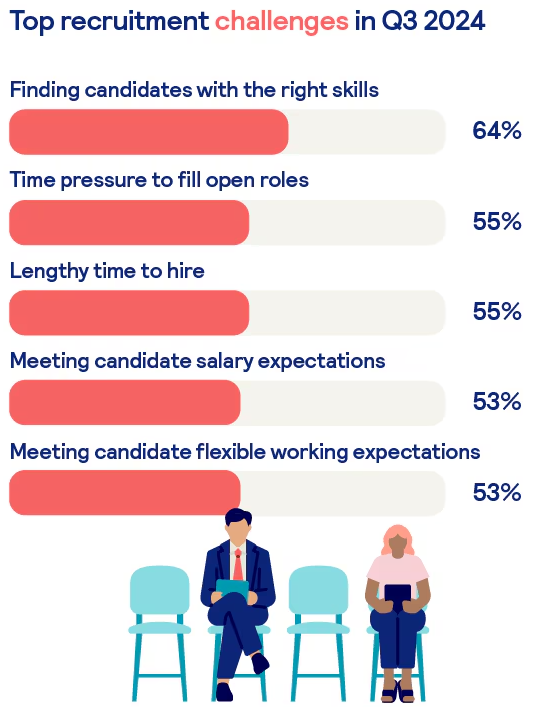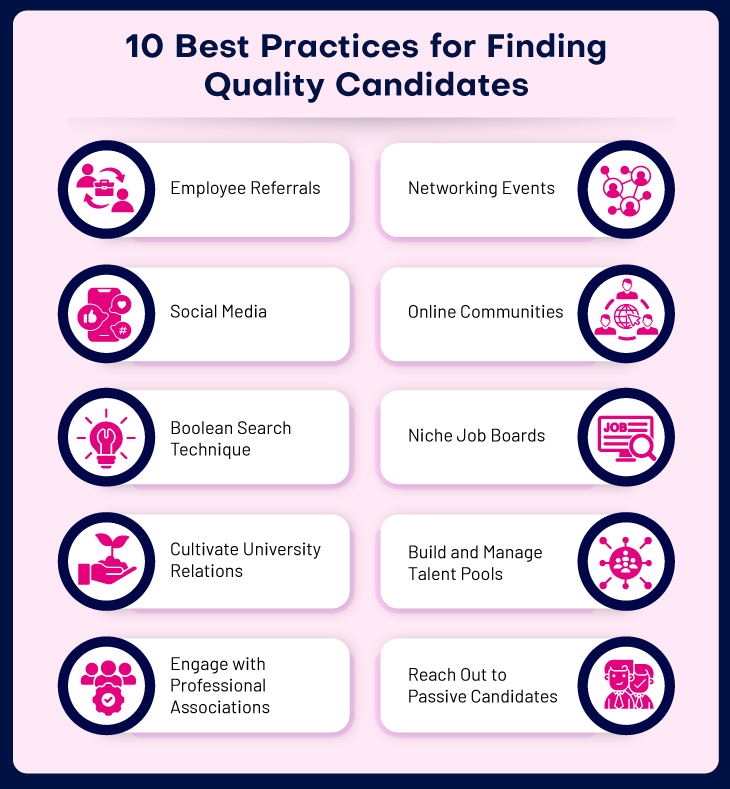Topics: candidate sourcing methods, talent sourcing strategies, UK Recruitment Industry
How UK Offshore Firms Filter Out Bad Resumes Through Candidate Sourcing Methods
Posted on November 14, 2024
Written By Abishek Balakumar

The UK recruitment industry is estimated to face a 20% rise in candidate volumes year-on-year. With an average of 40–50% of resumes being unqualified for any given role, the pressure on recruitment teams to sift through irrelevant resumes is at an all-time high.
For UK recruitment firms, filtering inefficiencies directly impact:
- Time-To-Hire
- Hiring Quality
- Recruiter Burnout

Source: totaljobs.com (Used for educational purposes)
Offshore firms bring a unique solution to this problem, using precise candidate sourcing methods to achieve an average of 35% faster resume filtering, according to a 2024 report from the Recruitment & Employment Confederation (REC).
Resumes filtering being one of the most outsourced candidate sourcing services in the UK as many recruitment companies experience an enormously high volume of applications coupled with strict hiring criteria.
- 62% of UK recruitment firms that have outsourced candidate sourcing in order to reduce in-house screening workload, optimise cost, and gain access to a wider pool of candidates.
- The time-to-fill in the outsourced services in fast placement roles is reduced by 35%. Also, it enhances candidate quality through advanced screening methods.
- 70% of the applications received are often not aligned with the job requirements. It necessitates a proper filtering of resumes with increased recruitment demands.

Exclusive Case Study Alert
How did a tech staffing agency generate £300,000 in revenue in just 9 months with outsourced candidate sourcing support?
Download
What Technologies Do Offshore Firms Use to Enhance Candidate Sourcing Efficiency?
Simply put. Candidate Sourcing Methods! Let’s move directly to the crux of the matter.
1. AI-Based Resume Screening
87% of firms offshoring have incorporated AI-based tools into their processes to screen with the support of ML and NLP for efficiently parsing resumes. It ensures technology-based:
- Filtering speeds increase dramatically, filtering out more than 65% of resumes that are screened within just minutes and do not cut up to the core requirements for the role.
- Candidate matching increases by 28% since algorithms highlight unique skill sets and even job-related keywords that human screeners may miss.
AI Screening can rank resumes by relevance, and offshore firms can optimise their sourcing for diverse roles in IT, healthcare, education and engineering.
2. Automated Scoring and Ranking Systems
Offshore firms use automated scoring systems that grade candidates against set standards such as skills, years of experience and educational background.
- Automated scoring systems help reduce the time a recruiter spends screening by 42%, especially on high-volume positions.
- This scoring methodology contributes to 23% improved quality-of-hire since the applicants are scored along set objective criteria.
These scoring systems especially help eliminate biases more efficiently than other screening techniques, thereby making the whole process much fairer and accurate.
3. Data Mining and Database Filtering
Offshore companies, equipped with large databases of candidates, use data mining techniques to search for suitable candidates. It filters previous applicants so that they use less time sourcing and not ask for new applicant pools.
- Data mining saves up to 37% of sourcing time because of pre-screened candidates being ready for the placement process.
- The process will result in candidate pipelines for offshore companies. This way, they are able to support pipelines of 12 months, rely less on third-party sources, and enable firms to save as much as 30% sourcing cost.
Data mining provides continuous flows of qualified candidates to enable offshore firms at filling their needs with the right talent at the shortest possible time.

50 OFFERS in Just 3 WEEKS!
Outsourced candidate sourcing support to meet immediate high-volume staffing demand. Download Now.
Download
What are the Best Smart Sourcing Strategies for Hiring Qualified Candidates?
Technology aside, offshore firms apply strategic processes for maximum functionality on candidate sourcing and filtering.
1. Talent pipelines
Talent pipelines are a constituent element of any successful offshore sourcing strategy. These pre-screened resources for qualified workers help offshore firms tap into a pool of ready-hire talent without having to conduct new searches every time.
- Strong pipelines yield 38% shorter time-to-fill rates and 21% higher retention for hot jobs.
- While pipeline sourcing is effective for senior profiles, it can reap high dividends since 58% of pipeline-sourced candidates stay in organisations for three or more years.
This implies not only that the recruitment agencies find candidates much quicker but also ensure higher hire quality with greater potential over the longer term.
2. Multichannel Sourcing for Passive Candidates
Offshore companies reach passive candidates using multi-channel approaches, through social media, email marketing, and job boards. With personalised outreach, the engagement rate of passive candidates has increased by 46%. It makes offshore firms very effective at tapping the hidden talent pool.
3. Data-Driven Recruitment Technologies Powering Sourcing Efficiency
89% of offshore recruitment firms are using data privacy standards and are aligned with the requirements of GDPR and they are using encryption and have certain secure access controls in place. Compliance tools used in such firms have increased data security by 32% over the last year and no firm has reported a data breach incident by 91% of compliant firms.
Long story short!

That raises a question!
How Offshore Firms Handle Data Privacy and Security During the Candidate Sourcing Process
1. Data Encryption and Secure Transmission
To protect data, firms make use of AES-256 encryption both in transit and at rest. This standard means that the chances of candidate data being read in case it is intercepted are zero. SFTP is also being used to ensure safe data exchange with close risks of breach.
2. Data Access Control and Authorisation Protocols
MFA and Role-Based Access Control restrict access so that personnel does not access any candidate data. This would bar unauthorised persons from accessing one’s data; hence, there is no internal data leakage, and privacy is enhanced.
3. Regular Data Audits and Compliance Reports
Offshore companies can identify their weaknesses and establish compliance by carrying scheduled audits. Automated compliance check systems notify the teams regarding the deviations in protocols, and scheduled audits ensure transparency, thereby boosting client confidence.
4. Anonymisation and Minimisation of Candidate Data
In offshore firms, information for analysis can be anonymised in order to ensure that only a code replaces personal identifiers minimising intrusion into privacy. There is also data minimisation; this was ensured through collecting only what was necessary in sourcing and then deleting the rest of it.
5. Data retention policies and secure deletion
The firms have retention policies that support GDPR and retain candidate data as long as necessary. As soon as the retention period has expired, firms make use of secure data erasure means like overwriting to completely erase remaining information such that it cannot be accessed in the future.
6. Secure Cloud Infrastructure and Vendor Management
It also ensures that all digital and physical storage is handled with safe environments through its partnerships with ISO 27001-certified cloud providers. Offshore companies also screen third-party vendors strictly, including data security clauses in terms and conditions controlling how partners treat candidate information.
7. Incident Response and Breach Notification Protocol
Organisations have prepared an incident response plan to respond and intervene in cases of a breach as quickly as possible. Incidences of breaches are reviewed by dedicated response teams, and organisations comply with GDPR’s 72-hour notification rule by immediately informing clients and authorities of breach details and mitigation steps undertaken.

200% Revenue Growth!
How a UK Finance Recruiter Sourced 800+ Candidates Daily
Download
Criteria for Identifying ‘Bad’ Resumes
To streamline the filtering process, offshore firms rely on certain screening criteria to identify “bad” resumes. These criteria help ensure only the most relevant applications make it to the next stage.
Key Factors in Resume Screening
- Does the candidate’s experience match the job description?
- Are essential skills and qualifications present?
- Does the resume include key technical terms and industry jargon?
- Is the resume tailored to the role or a general submission?
- Is there a consistent career trajectory, or are there frequent job changes?
- Do dates of employment reflect growth in the candidate’s field?
Common Red Flags in Resumes
- Job titles that vary significantly across roles may indicate a lack of clear expertise.
- Unexplained gaps raise questions about a candidate’s reliability or industry commitment.
- Frequent errors or poor formatting can suggest a lack of attention to detail or professionalism.
- Candidates who lack relevant industry experience may be unsuitable for specialised roles.
These red flags guide offshore firms in filtering out unsuitable resumes, creating a streamlined pool of candidates for recruiters.
FAQs
What technologies do offshore firms use to enhance candidate sourcing efficiency?
Technologies like AI-driven screening tools, automated scoring systems, and secure data mining help offshore firms to quickly and effectively filter candidates.
What metrics do offshore firms use to measure the success of their candidate-sourcing efforts?
Key metrics include time-to-fill, candidate quality, sourcing conversion rates, and cost-per-hire, which collectively measure the effectiveness of outsourced candidate sourcing.
Which recruitment agency stands out as the top choice for sourcing the best candidates?
Top choices vary, but agencies with strong partnerships with offshore firms and advanced sourcing tools stand out in speed, cost efficiency, and candidate quality.
To Sum Up!
Through a combination of technology and strategic sourcing methods, offshore firms help recruitment companies in the UK filter out “bad” resumes and streamline hiring processes. From AI-powered screening to data-driven metrics, outsourced sourcing firms provide a crucial service, reducing recruitment time and improving candidate quality. With the right technologies and a focus on data privacy, these firms empower recruitment agencies to meet evolving hiring demands while maintaining security and efficiency.
By continually refining their sourcing methods, offshore firms will remain essential partners for UK recruiters, enhancing hiring outcomes in an increasingly competitive industry.
Facing challenges with sourcing quality candidates?
Book a tailored consultation to streamline your hiring and filter out ‘bad’ resumes efficiently with top UK sourcing solutions.
Originally published Nov 14, 2024 11:11:30, updated Nov 14 2024
Topics: candidate sourcing methods, talent sourcing strategies, UK Recruitment Industry







